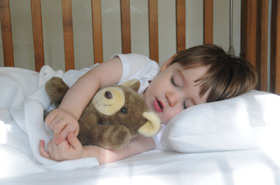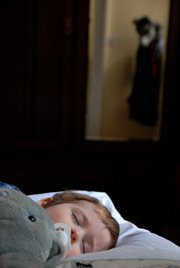Sleep Disorders in Children
Learn what are the sleep disorders in children

Sleep disorders in children are very difficult to diagnose, because it's not unusual for a child to suffer from sleep troubles.
Who hasn't had nightmares or bed-wetting when he was a child? Most of us had this problems, which are normal when we were toddlers or young children.
For many children there are times when bed-wetting or sleep talking occur because of bad dreams or illness.
Newborn babies need time to find their sleep rhythm in the first month after birth.
However, you may find that children can have serious sleep disorders, like obstructive sleep apnea or narcolepsy.
In this video, Dr. George White explains why sleep disorders may occur not only in adults, but children too:
The most common sleep disorders in children:
Narcolepsy
Narcolepsy in children can cause excessive sleepiness during the day, sleep paralysis and hallucinations.
A child with narcolepsy may feel tired more often than normal. They can fall asleep in school, in a bus, or in a pool.
A parent will think the child is daydreaming, like many other children. You can see why a sleep disorder in children is so difficult to diagnose.
Another symptom of narcolepsy is when the child is unable to move. This sleep paralysis can be scary for him because he may experience hallucinations and paralysis in the same time.
Imagine if you wake up in the middle of the night and you see a monster in your bedroom, and you cannot move away from it because your muscle are paralyzed. Now imagine that you're only five years old...
Sleep terror disorder

Sleep terror disorder can be a cause of sleeplessness in children.
If your child has night fears, then typically has an aversion to being alone in his bedroom at night. He will be even more frightened if the light is missing.
Night terrors in children may be seen between ages 3 to 6, when children's imagination is maturing. For example, I remember that when I was a little boy, I imagined that if I fall asleep at the edge of the bed, a claw will drag me under the bed.
Sleep talking and sleep walking
Sleep talking and sleep walking are another common sleep disorders in children. There are typically mild, but when these disorders become severe and dangerous to the sleeper, medical care is advised.
If you find your child in other room in the morning and he can't remember how he got there, talk with a pediatrician. He may recommend a sleep center evaluation.
To prevent any problem, lock the doors and windows each night and collect all objects that could cause injury.
Sleep talking sometimes accompanies sleepwalking, but often you will not understand what your child is saying. You may see a child urinating on the wall, speaking obscene words, running and screaming, or hitting an object and injure himself.
Doctors and scientist are not sure why people sleepwalk, but they think there may be a genetic cause. Stress or medications may also play a role.
In any case, if a child is violent in his sleepwalking, involving physical injury, or he leaves the house, the family should contact a medic immediately.
Bed-wetting
Bed-wetting is source of embarrassment for children and frustration for parents. It is a common sleep disorder, affecting many children and some adolescents.
Some children, may have a health problem which can trigger bed-wetting. Constipation, diabetes, urinary tract infections or obstruction may be to blame for this problem.
Other cause for bed-wetting may be emotional problems, including stress from parents or from school. Dreaming about making his needs at the bathroom is an example of emotional issue that caused bed-wetting.
In this video you can learn more about the sleep disorders in children:
The main side effects of sleep disorders in children
From all these sleep disorders in children, excessive daytime sleepiness is the most important symptom.
For a child, being sleepy all day for a long period of time, can have a big impact in his education and development.
Childhood is a time of learning and growth. In order for a child to develop, he must be awake and alert, able to interact with the world and learn from it.
However, a sleep disorder can impair a child from the benefits of a healthy childhood.
So, if you see your child having sleep problems for more than three or four consecutive night, and if he complains of sleepiness during the day at school, at the cinema or while eating, you should contact the doctor to check for any signs of sleep disorders.
It may be necessary for your child to visit a sleep center for a sleep test. There the doctor will decide what treatment your child will need in relation to his test results.
Home › Sleep Apnea in Children › Sleep Disorders in Children







